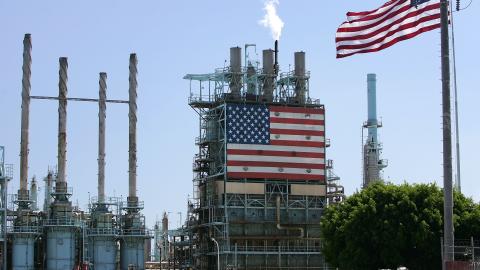The stronger our public policy at home, the fewer vulnerabilities are left that can be exploited by unfriendly nations. After nearly fifty years, the US had effectively eliminated a significant risk only to see it now return due to ineffectual domestic policy. That risk is energy.
Every presidential administration since the 1973 Arab oil embargo sought to address energy, with primary reference to oil. Thanks to both innovative extraction methods for fossil fuels and a boom in renewables, the US reached near energy independence by 2019.
That independence brought available, reliable, and affordable energy, which helped return manufacturing jobs to the US. It also eased consumers’ pocketbooks directly and indirectly by lowering the price at the pump while ensuring everything from consumer goods to industrial supplies and making everything we purchase less expensive. Moreover, low energy prices strengthened the economy and inoculated the country from global instability. It removed a lever for our geopolitical enemies to exploit. They say that the best defense is a good offense, and the best foreign policy is good domestic policy, and that starts with energy security.
The recent volatility in energy prices was entirely preventable and directly resulted from poor policy choices. Restrictions and burdensome permitting are hamstringing both fossil fuels and renewable deployment. Energy-thirsty supply chains are raising the cost of goods and resources. All the while many fear imminent harm as temperatures drop.
But it does not have to be this way.
America hosts some of the deepest and most diverse reserves of natural resources of any nation. From fossil fuels to nuclear and rare earth elements necessary to produce renewables, from vast flat plains to wind-brushed coasts, we have the means of energy independence entirely within our grasp.
The ideology of some within the green movement must be tempered against the simple reality that the world still runs on fossil fuels because it must do so. According to independent energy bodies such as the IAEA and the EIA, fossil fuels will not be optional for decades simply because baseload power requirements demand it. That is not to say renewables are unnecessary because they are a critical part of our current energy mix. Renewables' share of the energy mix will appropriately grow over time as we seek ways to reduce our carbon footprint.
Likewise, the fervency of the fossil-only crowd is equally misguided. The critical mistake policymakers on both ends of the spectrum have made is the folly of choosing one form over the over. The answer is not whether it is fossil fuels or renewables because the answer is both for the foreseeable future.
The future belongs to a new generation of energy, predominated by renewables and alternative energy already in use, such as hydropower and nuclear. But today’s shortages cannot be dismissed. Today and in the near term, the fastest route to energy is tapping our reserves and promoting the exploration and production of oil and natural gas. By showing strength at home, America is better equipped to aid our allies while increasing our footing to ward off would-be adversaries. American energy security is integral to being an “Arsenal of Democracy.” But this can only occur when the current administration understands it has a role to play in promoting a true “all of the above” approach to energy. Throwing stones at the fossil fuel industry is unwise and creates uncertainty. Regulations aimed at kneecapping the industry intentionally create ambiguity about the viability of investing in additional capacity. This uncertainty has deliberately raised financial risk in capital markets required to finance other production and the infrastructure needed to transport it to the market.
Surely our policymakers understand economics while musing aloud why there has been a reluctance to make new investments yet pleading with dictators and despots to increase the volume just as OPEC+ considers another round of production cuts. Similarly, raiding the Strategic Petroleum Reserve (SPR) to artificially reduce oil prices ahead of this year’s midterm elections only provides temporary relief while leaving the country vulnerable to a real crisis. That crisis will unfold in 2023 if the Biden administration does not alter course because the SPR will not be able to provide that extra cushion once it is drained. If domestic production is not increased, recent declines in unleaded gasoline pricing will be reversed this Spring. Worse still, the administration’s plan to replenish the SPR is wishful thinking, given that added oil does not exist.
Domestic policy must be centered on energy and viewed through the lens of reality. We need oil and gas today to keep the lights on, heat our homes, fuel supply chains, and power the economy. The benefit of appropriately leaning into fossil fuels today is that it strengthens our resilience to geopolitical pendulum swings and reduces the power of foreign actors bent on manipulating energy markets.
Make no mistake, the future belongs to green energy, but today's world still primarily runs on fossil fuels.
Read in RealClearEnergy.















